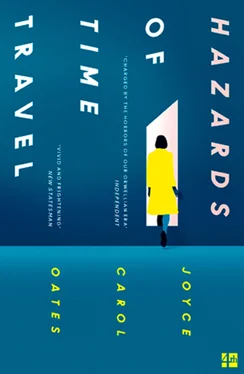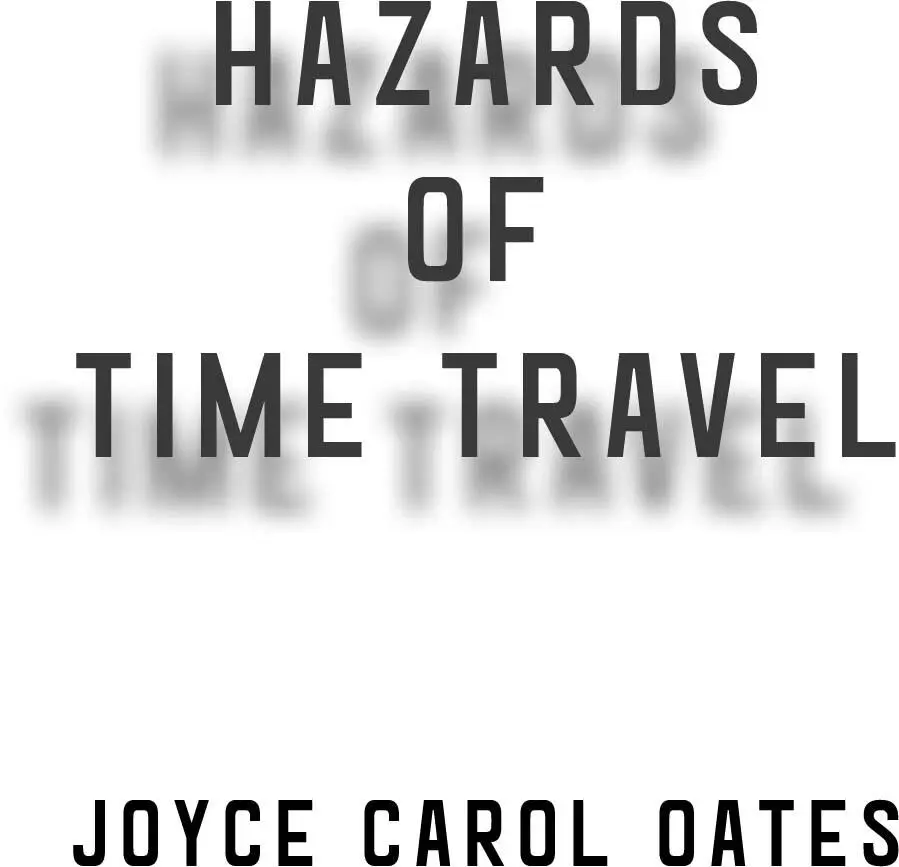
4th Estate
An imprint of HarperCollins Publishers
1 London Bridge Street
London SE1 9GF
www.4thEstate.co.uk
This eBook first published in Great Britain by 4th Estate in 2018
Copyright © 2018 by The Ontario Review, Inc.
Cover design by Heike Schüssler
Cover illustration inspired by Getty Images / Klaus Vedfelt
Joyce Carol Oates asserts the moral right to be identified as the author of this work
A catalogue record for this book is available from the British Library
All rights reserved under International and Pan-American Copyright Conventions. By payment of the required fees, you have been granted the non-exclusive, non-transferable right to access and read the text of this e-book on-screen. No part of this text may be reproduced, transmitted, down-loaded, decompiled, reverse engineered, or stored in or introduced into any information storage and retrieval system, in any form or by any means, whether electronic or mechanical, now known or hereinafter invented, without the express written permission of HarperCollins
Source ISBN: 9780008295448
Ebook Edition © October 2018 ISBN: 9780008295462
Version: 2019-10-04
For Stig Björkman,
and for
Charlie Gross
A self is simply a device for representing a functionally unified system of responses.
B. F. Skinner, Science and Human Behavior
Contents
Cover
Title Page
Copyright
Dedication
Epigraph
I: Valedictorian
The Instructions
Deletion
The Warrant
“Good News!”
The Arrest
“Disciplinary Measure”
Exile: Zone 9
II: Zone 9 – The Happy Place
Typewriter
The Lost One
Coed
Lost Friends
He, Him
Wolfman
Lonely
Possibly
Dean’s List
The Spell
Orphan
Suddenly
The Denial
The Wall
The Museum of Natural History
Shelter
The Sacrifice
Adoration
The Searchers
The Test
The Exam
The Failing Grade
Wolfman My Love: Selected Memories
Sane
The Lonely Girl I
The Lonely Girl II
April
“Terminated”
Elopement
The Bat
III: Wainscotia Falls
Saved
The Miracle
Grief
Visitors
“Uncle”
Heron Creek Farm
Acknowledgments
About the Author
Novels by Joyce Carol Oates
About the Publisher
They would not have come for me, naïvely I drew their attention to me. Willingly I dared what I should not have dared.
Of my own free will misjudging. Or rather, not judging—not thinking. In vanity and stupidity and now I am lost.
Sometimes on my knees in a posture of prayer I am able to break through the “censor barrier”—to remember …
But my brain hurts so! It is a terrible effort like struggling against the gravity of Jupiter.
My Exile-status forbids me to speak to anyone here of my sentence or of my life before Exile and so I am doubly lonely.
Though rarely alone in this strange place I am very lonely and am not sure that I can persevere.
My sentence is “only” four years. It might have been “life.”
Or, it might have been Deletion.
On my knees each night straining to remember, to recall my old, lost self, I try to be grateful, my sentence was not Deletion.
And I try to be grateful, no one in my family was arrested as a collaborator/facilitator of Treason, with me.
I
DI—“Deleted Individual.”
If you are Deleted, you cease to exist. You are “vaporized.”
And if you are Deleted, all memories of you are Deleted also.
Your personal property/estate becomes the possession of the NAS (North American States).
Your family, even your children, if you have children, will be forbidden to speak of you or in any way remember you, once you cease to exist.
Because it is taboo, Deletion is not spoken of. Yet, it is understood that Deletion, the cruelest of punishments, is always imminent.
To be Deleted is not equivalent to being Executed.
Execution is a public-lesson matter: Execution is not a state secret.
A certain percentage of executions under the auspices of the Federal Execution Education Program (FEEP) are broadcast via TV to the populace, for purposes of moral education.
(In a prison execution chamber made to resemble a hospital surgery, the CI [Condemned Individual] is strapped to a gurney by prison guards; then, in the clinical-white uniforms of “medics,” prison staffers administer the lethal dose of poison into the CI’s veins as tens of millions of home TV viewers watch.)
(Except us. Though Dad was already of MI [Marked Individual] status, and his Caste Rank [CR] vulnerable, neither Dad nor Mom allowed our TV to be turned on at Execution Hours which were often several times a week. My older brother Roderick objected to this “censorship” when he was still in school on the grounds that, if his teachers discussed the educational aspect of an execution in class, he would not be able to participate and would stand out as “suspicious”—but this plea did not persuade our parents to turn on the TV at these times.)
Deletion is a different status altogether, for while Execution is intended to be openly discussed, even to allude to Deletion is a federal offense punishable as Treason-Speech.
My father Eric Strohl had been MI since a time before I was born. As a young resident M.D. in the Pennsboro Medical Center he’d been under observation as a scientifically-minded individual, for such individuals were assumed to be “thinking for themselves”—not a reputation anyone would have wished to have. In addition, Dad was charged with associating with a targeted SI—(Subversive Individual)—who was later arrested and tried for Treason; Dad hadn’t done more than sympathetically listen to this man address a small gathering in a public park when he and the others were caught in a Homeland Security “sweep”—and Dad’s life was changed forever.
He was demoted from his residency in the medical center. Though he had an M.D., with special training in pediatric oncology, he could find work only as a lowly-paid medical attendant in the center, where there had to be maintained a bias against him, that he might never be allowed to “practice” medicine again. Yet, Dad never (publicly) complained—he was lucky, he often (publicly) said, not to be imprisoned, and to be alive.
From time to time MIs were obliged to restate the terms of their crimes and punishments, and to (publicly) express gratitude for their exoneration and current employment. On such occasions Dad took a deep breath and, as he said, bartered his soul another time.
Poor Dad! He was so good-natured in our household, I don’t think I realized how terrible he must have felt. How broken.
Within the family it was understood that we didn’t discuss Dad’s status per se , but we seemed to be allowed—that is, we were not expressly forbidden—to allude to his MI status in the way you might allude to a chronic condition in a family member like multiple sclerosis, or Tourette’s, or a predilection for freak accidents. Being MI was something shameful , embarrassing , potentially dangerous— but since MI was a (relatively) minor criminal category compared with more serious criminal categories, it wasn’t a treasonable offense to acknowledge it. But Dad took risks, even so.
Читать дальше














